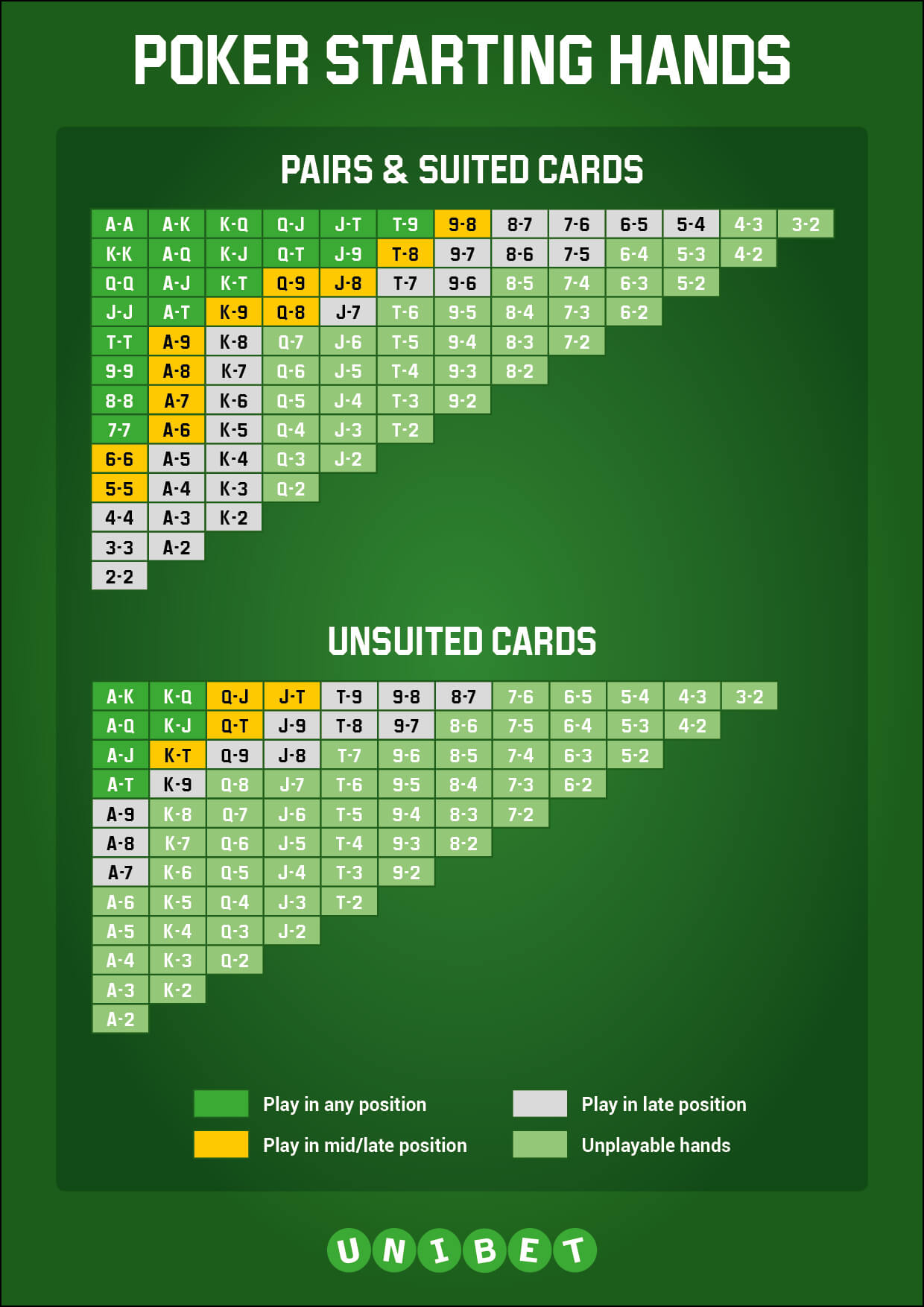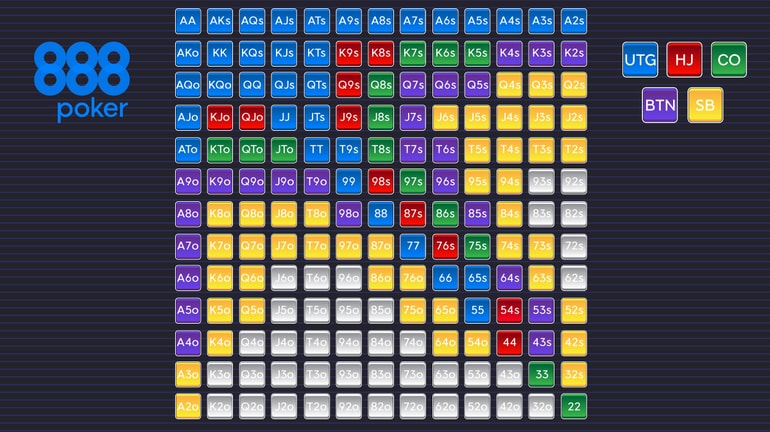- What Percentage Of Hands Should You Play In Poker Quiz
- What Percentage Of Hands Should You Play In Poker Chart
You should aim for a flop percentage of about 10-15% in the early-mid stages, and 15 – 20% in the middle to late stages. Calling the flop in tournaments should take into account a few important factors: your position, characteristics of your table, and your hands. Position in my opinion is. Play less than 20% of your hands when you are at a table against 9 to 10 players. If you prefer a tight style of playing, use only 10% of your hands before reaching the flop. This may give you the experience and control required to win the game at a low-stakes table. You can see the extremely low average winning poker hand percentages for commonly played hands like Q-10 or J-9 so my advice would have to be to stick to the premium hands as you learn the game. As you gain more experience you can experiment with those lower percentage starting cards, but you’ll need to be disciplined enough to learn when to continue beyond the flop. Every poker hand’s strength. And with a total of 14 of the 169 starting hands (6.3% of all hole cards dealt), 80% of all profits are made. So this should make it obvious that you should only play few hole cards in Texas Hold’em Cash Games. And in poker tournaments like Sit and Go’s, Double or Nothing or MTT, you should play even less starting hands. Poker Starting Hands - Comprehensive guide to which poker hands you should play.
Odds Charts:Ratio Chart : Percentage Chart : Conversion Chart
This percentage poker odds chart highlights the percentage chance of completing your draw based on the number of outs you have at different points in a hand. The odds of completing your draw have been rounded to 1 decimal place in this percentage chart.
Look below the table for more information on how to use the percentage odds chart.
Percentage odds chart.

| Outs | 1 Card To Come (flop) | 1 Card To Come (turn) | 2 Cards To Come (flop) |
|---|---|---|---|
| 1 | 2.1% | 2.2% | 4.3% |
| 2 | 4.3% | 4.3% | 8.4% |
| 3 | 6.4% | 6.5% | 12.5% |
| 4 (gutshot) | 8.5% | 8.7% | 16.5% |
| 5 | 10.6% | 10.9% | 20.4% |
| 6 | 12.8% | 13.0% | 24.1% |
| 7 | 14.9% | 15.2% | 27.8% |
| 8 (straight) | 17.0% | 17.4% | 31.5% |
| 9 (flush) | 19.1% | 19.6% | 35.0% |
| 10 | 21.3% | 21.7% | 38.4% |
| 11 | 23.4% | 23.9% | 41.7% |
| 12 | 25.5% | 26.1% | 45.0% |
| 13 | 27.7% | 28.3% | 48.1% |
| 14 | 29.8% | 30.4% | 51.2% |
| 15 (s + f) | 31.9% | 32.6% | 54.1% |
| 16 | 34.0% | 34.8% | 57.0% |
| 17 | 36.2% | 37.0% | 59.8% |
| 18 | 38.3% | 39.1% | 62.4% |
| 19 | 40.4% | 41.3% | 65.0% |
| 20 | 42.6% | 43.5% | 67.5% |
| 21 | 44.7% | 45.7% | 69.9% |
| 22 | 46.8% | 47.8% | 72.2% |
Percentage table key.
- Gutshot - A straight draw with only one card able to complete it. e.g. 6-8 on a 5-9-Q board (only a 7 completes).
- Straight - A standard open-ended straight draw with more outs. e.g. 6-8 on a 5-7-Q board (4 and 9 complete).
- Flush - A hand where another card of the same suit is needed to complete the draw.
- s + f - Both an open ended straight draw and flush combined. e.g. 6 8 on a 5 7 Q board.
How to use the percentage odds chart.
- Work out the number of outs you have (use the colours to help guide you).
- Look up the percentage odds of completing your draw depending on whether you are on the flop or turn.
That's simple enough, but why are there 2 columns for percentage odds on the flop? The first 2 columns with 1 card to come are the odds that you should be using most frequently. These are the standard odds that assume we could potentially face another bet on the next betting round.
The last 2 cards to come column is for when you or your opponent are being placed all in on the flop. Therefore, because you do not expect to have to call another bet or raise on future betting rounds, you can now use these improved odds for seeing 2 cards instead of 1.
If you can't remember or figure out the percentage odds of completing your draw in the middle of hand, try using the rule of 4 and 2 as a rough guide. It's a great little shortcut for percentage odds.
How to turn a percentage in to a ratio.
Divide 100 by the percentage. Then take 1 away from that number and you will have x to 1.
So for example, if you have a flush draw on the turn, the percentage chance of completing your draw is 19.6% (let's call it 20%).

- 100 / 20 = 5.
- 5 - 1 = 4.
- So the ratio is 4 to 1.
It is a good idea to round the percentages to a number that you can easily divide in to 100 to help keep the working out as simple as possible.
Quick percentage odds chart example.
If you have 12 outs to make the winning hand on the flop, you should only call a bet that is equal to 25.5% of the total pot, which is roughly 25%.
So for example, lets say that our opponent has bet $50 in to a $100 pot making it $150. Because we are using the percentage method, we have to add our own potential call of $50 to create a total pot size of $200 - don't forget this! Therefore, based on this final pot size of $200 we can call up to 25% of this amount, which turns out to be $50 anyway. It's a bit tricky, but just as long as you add your own potential call to create the final pot size you will be fine.
For more information on working out percentage odds with drawing hands, see the pot odds article.
Go back to the poker odds charts.
Can You Afford Not To Use
Poker Tracker 4?
“I wouldn’t play another session of online poker without it”
“I play $25NL, and in under 1 week PT4 had paid for itself”
What Percentage Of Hands Should You Play In Poker Quiz
Comments
Play Where the Fishes are! Join 888 Poker!888 Poker has one of the easiest to beat player pools. Don't join the sharks on PokerStars, play where the real fish are!
>>Beat the Fish at 888 Poker Now!<<What’s Your MTT Flop Percentage?
The biggest mistake weak players in MTTs make is calling to see the flop too often or not pre-flop raising enough. The question is what is a good flop percentage in tournaments? It’s true in cash games you should be averaging to see a flop percentage of about 30% (percentage of times you call to see the flop for each hand dealt), however tournaments are not cash games.

In tournaments and MTT strategy this figure needs to be much lower. You should aim for a flop percentage of about 10-15% in the early-mid stages, and 15 – 20% in the middle to late stages. Calling the flop in tournaments should take into account a few important factors: your position, characteristics of your table, and your hands.
Position in my opinion is the most important factor. From late position you’ll often receive better odds for calling the flop because you’ll have the most information on your table at each round. You should also be blind stealing and limping more from the CO so you’re bound to see more flops. In Early position and the blinds, MTT players make the worst decisions and call the flop too often. To defend your blinds properly, you need to raise or fold an open-raiser from SB and BB. Flat-calling normally gives you negative EV because you have to act first on all future streets.
If you’ve not started using professonional MTT tools such as tournament indicator then you should do so now. These tools let you view everyones VPIP% (how often they see the flop), which in turn allows you to adjust to each player’s playing style. During the early stages of a tournament a typical TAG will have a VPIP% below 10%. This is ok considering we want to play tight in the early stages, but once the middle stages begin you should be seeing a VPIP% up to 20%. Anything less than this means you have room to improve.
Why Do Bad MTT Players Have a Higher Flop Percentage in Tournaments?

There are two logical reasons in my opinion why bad players have a higher flop percentage in tournaments.
- The first reason is that they want to hit a monster. New players don’t like to risk their entire tournament stack on just a few hands, so they try to counter this risk by getting involved in as many pots as possible. The rational of a bad player is that the more flops he/she sees, the higher the chance of hitting a very strong hand and trapping a large number of players. While it’s true this will yield a big payoff, the number of hands required to do this will make your stack so small that by the time you make a hand you’re winnings won’t be as big as you thought. This type of play requires a much bigger stack than that given at the start of MTTs to deal with the variance.
- The second reason for this high flop percentage in bad players is because their starting hand range is bad. Particularly in the early stages of tournaments you should only consider calling to see the flop with premium hands most the time. This includes AK, AQ, AJ (late position), pocket pairs and suited connectors from late position. The fact bad players don’t fold hands outside this range leads to a higher flop percentage – which bleeds chips.
Your Flop Percantage Should Change as You Progress in the Tournament
As you progress through the tournament to the middle and later stages your flop percentage should increase. This is because in the middle and later stages of the tournament you should be opening up your starting hand range to include things like pocket pairs and raising in middle position with suited connectors or A10 from late position on a dry board. From the middle stages we should have a VPIP% above 15% and once we make it to the final table and the game becomes short-handed we should see our flop percentage rise to even 20% or more.
Related articles:
Leave a Reply
What Percentage Of Hands Should You Play In Poker Chart
- $400
- $2000
T&C apply to bonus offerings